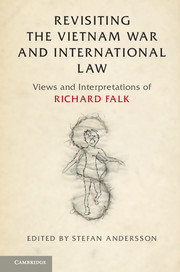Book contents
- Frontmatter
- Dedication
- Contents
- Foreword: The Harmful Legacy of Lawlessness in Vietnam
- Preface
- Acknowledgments
- PART I THE US ROLE IN VIETNAM AND INTERNATIONAL LAW
- PART II WAR AND WAR CRIMES
- 6 A ppropriating Tet
- 7 Son My: War Crimes and Individual Responsibility
- 8 The Cambodian Operation and International Law
- PART III THE VIETNAM WAR AND THE NUREMBERG PRINCIPLES
- PART IV THE LEGACY OF THE VIETNAM WAR
- Index
7 - Son My: War Crimes and Individual Responsibility
from PART II - WAR AND WAR CRIMES
Published online by Cambridge University Press: 28 December 2017
- Frontmatter
- Dedication
- Contents
- Foreword: The Harmful Legacy of Lawlessness in Vietnam
- Preface
- Acknowledgments
- PART I THE US ROLE IN VIETNAM AND INTERNATIONAL LAW
- PART II WAR AND WAR CRIMES
- 6 A ppropriating Tet
- 7 Son My: War Crimes and Individual Responsibility
- 8 The Cambodian Operation and International Law
- PART III THE VIETNAM WAR AND THE NUREMBERG PRINCIPLES
- PART IV THE LEGACY OF THE VIETNAM WAR
- Index
Summary
No voice has been more passionate and persuasive in its call for a renewal of the laws of war than that of Josef Kunz. Especially in the period since the end of World War II Professor Kunz wrote against the prevailing tendency to regard the idea of law-in-war as little more than a relic from the pre-nuclear age. The Vietnam War has emphasized, although the Korean War, the three Middle Eastern wars, and the many lesser wars throughout the world since 1945 should have made it plain, that the development of nuclear weapons did not mark the end of so-called conventional warfare, nor assure us that there would be either peace or catastrophe in world society. The massacre at Son My was, I suppose, the most macabre possible demonstration that the law of war remains relevant, and that its effective enforcement would mitigate the horrifying experience of warfare for a society torn apart by struggling armies.
But there is a danger of misunderstanding. The most minimal reading of customary rules of international law prohibits the acts that took place at Son My, and yet they happened. Rules of international law do not assure conforming conduct unless the military and civilian leadership of the armed forces gives these rules active and genuine respect and unless the official tactics of the war are themselves sensitive to the basic principles of limitation on warfare embodied in the rules of customary and treaty international law.
Thus, new rules more responsive to the actualities of contemporary warfare would offer no assurance of their respect. An entire political climate of support for such rules must be brought into being. In working, then, for the reform and revitalization of the laws of war – the essence of Professor Kunz's eloquent plea – it is essential to work for a new political climate, as well as to urge the adoption of new rules and procedures for interpretation and enforcement. The Vietnam War has amply demonstrated how easily modern man and the modern state – with all its claim of civility – relapse into barbarism in the course of pursuing belligerent objectives in a distant land where neither national territory nor national security is tangibly at stake.
- Type
- Chapter
- Information
- Revisiting the Vietnam War and International LawViews and Interpretations of Richard Falk, pp. 207 - 225Publisher: Cambridge University PressPrint publication year: 2017
- 1
- Cited by

